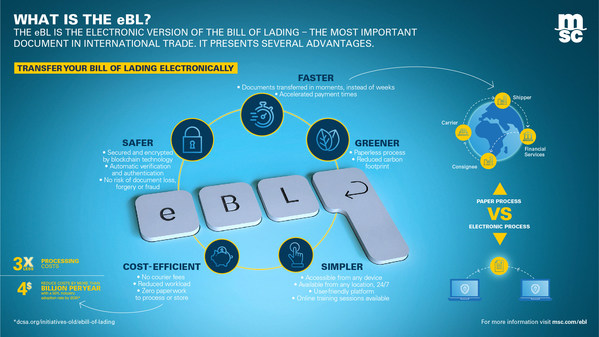 |
 |
- MSC customers will be able to receive the bill of lading electronically, without any change or disruption to their day-to-day business operations.
- Eliminating paper from the shipping transaction will make every aspect of commercial container shipping easier, faster, more effective and more secure.
- The shipping industry can save almost USD 4 billion by transitioning to an eBL.
- Electronic bills of lading (eBL) help mitigate the impact of trade disruptions on cargo flows during COVID-19.
GENEVA, April 28, 2021 /PRNewswire/ -- MSC Mediterranean Shipping Company, a global leader in container shipping and logistics, is officially introducing the electronic bill of lading (eBL) for its customers around the world, following a successful pilot phase, using a solution on an independent blockchain platform WAVE BL. The eBL enables shippers and other key supply chain stakeholders to receive and transmit the bill of lading document electronically, without any change or disruption to day-to-day business operations.

WAVE BL is a blockchain-based system that uses distributed ledger technology to ensure that all parties involved in a cargo shipment booking can issue, transfer, endorse and manage documents through a secure, decentralised network. Users can issue all originals, negotiable or non-negotiable, and exchange them via a direct, encrypted, peer-to-peer transmission. It's also possible for users to amend documents. WAVE BL's communication protocol is approved by the International Group of Protection & Indemnity Clubs, and meets the highest industry standards for security and privacy.
"MSC has chosen WAVE BL because it is the only solution that mirrors the traditional paper-based process that the shipping and cargo transportation industry is used to," says André Simha, Global Chief Digital & Information Officer at MSC. "It provides a digital alternative to all the possibilities available with traditional print documents, just much faster and more secure."
The WAVE BL platform can be used free of charge throughout 2021 for exporters, importers and traders. Users only pay for issuing the original documents, and they do not need to invest in any IT infrastructure or make operational changes in order to use the service. They can simply sign up via MSC's website: www.msc.com/eBL.
Longstanding advocacy for digitalisation in shipping
MSC has long recognised the importance of digitalisation across the shipping industry and has been one of the pioneers behind the industry's digital transformation. As a founding member of the Digital Container Shipping Association (DCSA), MSC has participated in a number of initiatives focused on driving standardisation, digitalisation and interoperability in container shipping. André Simha is also the Chairman of DCSA.
Introducing an eBL solution is a critical step in the overall digitalisation of the industry. "Traditionally, the shipping industry has relied quite heavily on physical paper documents. And among these, the BL is the most important transport document in international trade," states André Simha. "While there have been attempts to create an eBL solution in the past, we are now in a position to introduce a solution that can pave the way to mass eBL adoption, which will mean significant savings for the shipping industry."
Saving the shipping industry billions
DCSA reearch indicates that by achieving just 50% eBL adoption by 2030, the industry could potentially save more than USD 4 billion per year. In addition to the significant cost savings, the eBL offers a wide range of benefits to shippers, including eliminating the 'Document transportation' factor from the supply chain. Shippers can instantly transfer original and negotiable electronic documents across borders. The solution enables faster document transfers, which in turn, leads to a shorter payment cycle. And electronic processes are far less susceptible to forgery, fraud, loss or human error.
As André Simha comments, "Eliminating paper from the shipping transaction will make every aspect of commercial container shipping better, faster, more effective, more secure and environmentally-friendly."
Gadi Rushin, WAVE BL's CEO and Co-founder, "Our goal from the very start has been to change the way the world trades by digitising document workflows while ensuring the highest legal, security and privacy standards. MSC is helping to create a new trade norm that will ultimately affect the rest of the market and save the trade industry billions of dollars."
Helping countries severely impacted by COVID-19
While MSC has worked with WAVE BL on piloting its eBL solution since 2019, COVID-19 has created an even greater drive towards digitising the BL. "The global pandemic has restricted human and transport mobility in many places," André Simha explains. "Countless containers have been stuck at various ports, terminals, depots and warehouses around the world because the receiver doesn't have the original paper BL required to release these goods at their destination."
Here the eBL addresses a very current need, enabling stakeholders to overcome border restrictions, interruptions in postal services and other pandemic-related disruptions. Shippers can also allow employees to work remotely by dematerialising the BL and other shipping documents.
Worldwide implementation
After running successful pilot projects in select countries since 2019, MSC is now introducing its digital solutions to all customers worldwide, paving the way for widespread eBL adoption. MSC is also exploring other eBL platforms to adapt to market demands.
"Now we're introducing our eBL solution to our broad customer base to ensure that even more of our customers are able to benefit from the advantages of a digital BL solution. In a matter of a few years, we expect the eBL to become the new norm." André Simha states.
For more information on MSC's eBL: www.msc.com/eBL
For more information on WAVE BL: www.wavebl.com
About MSC: MSC Mediterranean Shipping Company, headquartered in Geneva, Switzerland, is a global leader in transportation and logistics, privately owned and founded in 1970 by Gianluigi Aponte. As one of the world's leading container shipping lines, MSC has 524 offices across 155 countries worldwide with over 100,000 employees. With access to an integrated network of road, rail and sea transport resources which stretches across the globe, the company prides itself on delivering global service with local knowledge. MSC's shipping line sails on more than 215 trade routes, calling at over 500 ports.
For more information visit www.msc.com
About WAVE BL: WAVE BL is a blockchain-based digital courier platform that mirrors the traditional process for transferring original paper documents — electronically. Our solution enables instant, encrypted and authenticated transfer of Bills of Lading and other unique digital documents. WAVE BL's platform is designed to meet the needs of every member along the supply chain, from the smallest importer to the largest shipping carriers and banks.
For more information visit www.wavebl.com